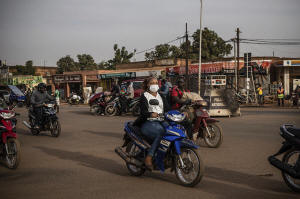|
The military's leader, Ibrahim Traore, said officials in the
dissolved government will continue to perform their duties until
a new government is formed. No reason was given for the move.
The junta in Burkina Faso seized power in September 2022 by
ousting the military rule of Lt. Col. Paul Henri Sandaogo Damiba
about eight months after it staged a coup to remove
democratically elected President Roch Marc Kaboré.
The country is one of several West African nations where the
military has recently taken over, capitalizing on popular
discontent with previous democratically elected governments over
security issues.
However, since its inception, the junta has struggled to end
Burkina Faso’s security challenges — the very reason that it
claimed had prompted it to take power.
Growing attacks by extremists linked to al-Qaida and the Islamic
State group have devastated Burkina Faso where thousands have
been killed in recent years and more than 2 million people have
been displaced, half of them children.
Around half of Burkina Faso’s territory remains outside of
government control, analysts say.
The country's transitional government has been running under a
constitution approved by a national assembly that included army
officers, civil society groups and traditional and religious
leaders.
Under pressure from West Africa's regional bloc known as ECOWAS,
the junta had set a goal to conduct an election in July to
return the country to democratic rule. However, in May it
extended its transition term for five more years, the duration
of one presidential term.
Alongside the coup-hit nations of Niger and Mali, Burkina Faso
has severed ties with longstanding Western and regional
partners, including former colonial ruler France and the
regional bloc of ECOWAS, which they quit early this year.
All contents © copyright 2024 Associated Press. All rights
reserved |
|




